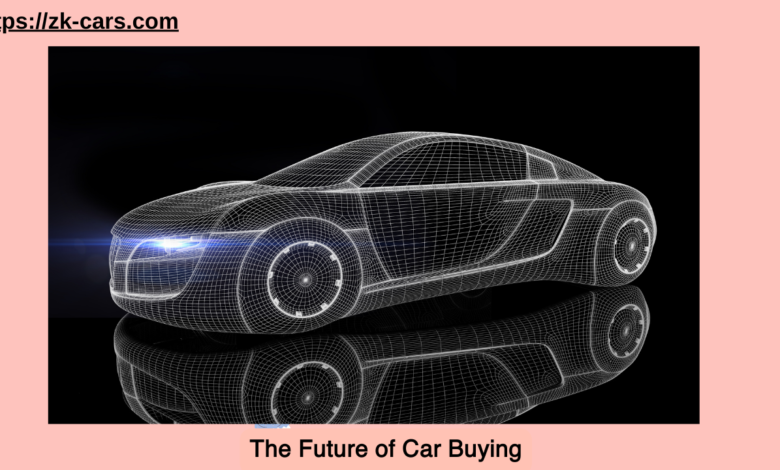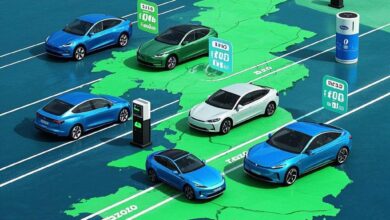The Future of Car Buying: Trends to Watch
The Future of Car Buying: Trends to Watch

The automotive industry is undergoing a transformation driven by technological advancements, changing consumer preferences, and environmental concerns. The future of car buying is poised to shift dramatically in the coming years, offering buyers more choices, flexibility, and innovative experiences than ever before. From electric vehicles (EVs) to online car purchasing and shared ownership models, several trends will shape how we buy cars in the future. In this comprehensive car buying guide, we’ll explore the most significant trends you should keep an eye on.
1. Rise of Electric Vehicles (EVs)
One of the most impactful trends in the future of car buying is the surge in electric vehicles (EVs). Governments worldwide are pushing for greener, more sustainable modes of transportation, and automakers are responding by ramping up the production of electric models.
- Increased EV Options: Many manufacturers are planning to offer a broader range of electric vehicles. From affordable electric compact cars to luxury electric SUVs, consumers will have more options in terms of size, design, and price.
- Government Incentives: Many governments offer tax incentives, rebates, and subsidies for purchasing electric cars. These incentives aim to make EVs more accessible to a wider audience, making them a crucial consideration for future car buyers.
- Charging Infrastructure Growth: With the growing popularity of EVs, the expansion of charging infrastructure is inevitable. Soon, we can expect to see more charging stations in public areas, workplaces, and even at home, providing convenience for EV owners.
As this shift continues, potential buyers will need to weigh the benefits of EVs, such as reduced emissions and lower running costs, against the current limitations, such as higher upfront costs and limited range.
2. Online Car Buying: A Digital Revolution
The way people shop for cars is changing. Traditionally, buying a car involved multiple visits to dealerships, face-to-face negotiations, and test drives. However, with the growth of e-commerce and the influence of the pandemic, the online car-buying experience has gained momentum.
- Virtual Dealerships: Many automakers and dealerships now offer virtual showrooms where consumers can browse vehicles, customize options, and even complete the purchase entirely online. This reduces the need for physical dealership visits, making the process faster and more convenient.
- Home Test Drives and Delivery: Car buyers can now schedule test drives from the comfort of their homes. In some cases, dealerships are offering to deliver the car directly to the customer’s door. This eliminates the stress of visiting multiple dealerships.
- Financing and Trade-Ins Online: Buyers can arrange financing, calculate monthly payments, and even trade in their old vehicles online. Digital tools make it easier to get pre-approved for loans, compare offers, and find the best financing terms.
- The Role of Third-Party Platforms: Companies like Carvana and Vroom have popularized the idea of buying cars completely online. These platforms allow buyers to purchase vehicles without ever stepping foot in a dealership, streamlining the process from selection to financing and delivery.
Online car buying is set to become even more sophisticated, with immersive technologies like virtual reality (VR) and augmented reality (AR) enhancing the shopping experience. Soon, buyers may be able to take virtual test drives and interact with vehicles in a fully digital environment.
3. Subscription-Based Car Ownership
In the future, car ownership as we know it may look very different. Car subscription services are gaining traction, offering consumers an alternative to traditional ownership models.
- What Are Car Subscriptions? Car subscription services allow consumers to drive a car for a fixed monthly fee, which typically includes insurance, maintenance, and roadside assistance. Subscribers can swap vehicles periodically and upgrade or downgrade based on their needs.
- Flexibility Over Commitment: Unlike traditional leases or car loans, subscription models offer more flexibility. Consumers aren’t locked into long-term contracts and can change vehicles depending on their lifestyle or needs. This is particularly appealing for those who prefer the latest models without the hassle of buying or selling.
- Major Players in the Market: Several automakers have already launched subscription services, such as Volvo’s Care by Volvo and Porsche Drive. These services are expected to become more widespread as manufacturers recognize the growing demand for flexibility in car ownership.
Subscription services could reshape the future of car buying by offering a more convenient, low-commitment alternative to traditional financing or leasing. As these services grow, buyers may prioritize flexibility and variety over ownership.
4. Autonomous Vehicles (AVs): Driving into the Future
Another groundbreaking trend in the future of car buying is the development of autonomous vehicles (AVs). While fully autonomous cars are not yet widely available, they are rapidly becoming a reality. Several automakers, including Tesla, Waymo, and GM, are investing heavily in the technology.
- What Are Autonomous Vehicles? Autonomous vehicles, also known as self-driving cars, use sensors, cameras, and artificial intelligence to navigate roads without human intervention. The goal is to create cars that can drive themselves, reducing accidents caused by human error and improving road safety.
- Levels of Autonomy: There are different levels of vehicle autonomy, from driver assistance systems (like cruise control and lane-keeping) to fully autonomous cars that require no human involvement. Over time, we can expect cars to become more autonomous, even if full autonomy is still a few years away.
- Impact on Car Buying: In the future, buyers may choose cars based on their level of autonomy, with self-driving features becoming a major selling point. Additionally, autonomous vehicles could lead to a reduction in car ownership, as shared self-driving fleets become a more convenient and cost-effective option.
While fully autonomous cars are still a work in progress, the increasing availability of driver assistance systems is already influencing how consumers choose their vehicles.
5. Shared Mobility and Ride-Hailing Services
The rise of shared mobility services and ride-hailing platforms like Uber and Lyft is another trend shaping the future of car buying. As cities become more congested and the cost of owning a car rises, many consumers are turning to shared transportation solutions.
- Car-Sharing Programs: Companies like Zipcar and Turo allow users to rent cars on-demand, offering a convenient and affordable alternative to ownership. This trend is likely to grow, especially in urban areas where parking and maintenance costs are high.
- Impact on Ownership: As shared mobility services become more popular, some consumers may decide not to buy a car at all. Instead, they may opt to use ride-hailing apps or rent cars when needed. This shift could reduce the overall demand for personal vehicles, particularly in cities where alternative transportation options are readily available.
- Environmental Benefits: Shared mobility can also contribute to reducing the environmental impact of transportation by decreasing the number of vehicles on the road and encouraging the use of electric or hybrid cars within these services.
For future car buyers, it will be important to consider how these changes in mobility will impact their transportation needs. Car ownership may no longer be the default option for everyone.
6. Green Technology and Sustainable Materials
As environmental concerns become more prominent, the future of car buying will also be influenced by green technology and the use of sustainable materials in vehicle production.
- Eco-Friendly Cars: Beyond electric vehicles, automakers are exploring alternative energy sources such as hydrogen fuel cells and hybrid powertrains. These innovations are designed to reduce greenhouse gas emissions and reliance on fossil fuels.
- Sustainable Materials in Manufacturing: The automotive industry is also focusing on using recycled and eco-friendly materials to build cars. For example, some manufacturers are using plant-based plastics, recycled metals, and environmentally friendly paints in the production process.
- Consumers’ Role: Car buyers are becoming more eco-conscious, with many opting for greener vehicles to minimize their carbon footprint. In the future, sustainability will be a key factor in the decision-making process for many consumers.
As green technology continues to evolve, the car buying experience will shift to prioritize sustainability, with more options for environmentally friendly vehicles and materials.
Conclusion: Embracing the Future of Car Buying
The future of car buying is evolving rapidly, driven by technological innovation, changing consumer preferences, and the growing emphasis on sustainability. From electric vehicles and autonomous driving to subscription services and online car purchasing, the way we buy and own cars is being redefined.
For buyers, this transformation offers exciting new possibilities and greater flexibility. However, it also requires careful consideration of new factors such as sustainability, digital tools, and mobility options. Staying informed about these trends will ensure that you make the best decision when navigating the future of car buying.
Common Questions:
- What are the benefits of electric vehicles for future car buyers? Electric vehicles offer lower running costs, government incentives, and reduced environmental impact compared to traditional gasoline-powered cars.
- Is buying a car online safe? Yes, many reputable platforms and dealerships offer secure online car buying experiences with financing options, warranties, and delivery services.
- How will autonomous vehicles affect car ownership? Autonomous vehicles could reduce the need for individual car ownership by offering shared, self-driving fleets as a more convenient option.
- What is a car subscription service? Car subscription services allow you to drive a car for a fixed monthly fee




